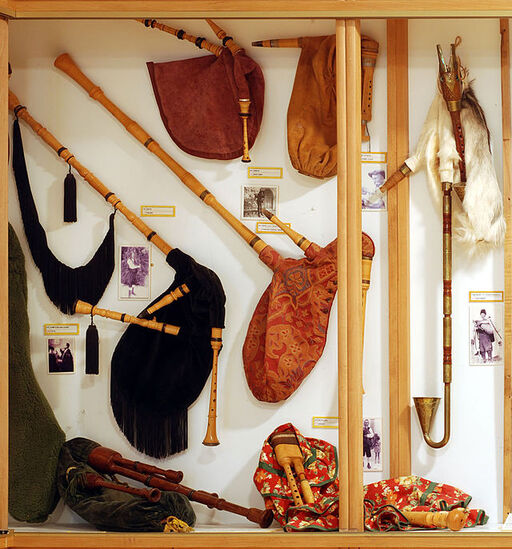 [Photo by Larkin Hammond on Unsplash] For about eighteen months I have posted on most Sunday evenings a snippet of my life as a Baptist. My stated purpose was to pay homage to the people and places that formed me as a Christian, to acknowledge the good I gained. Some of you have followed and commented faithfully, and I appreciate that more than you can know. I have other stories of hurt and harm, and this is not the place for them. So I believe I’ve come to the end of this particular road. If there’s something else you’d like me to blog about (I can go on for quite a while about the Methodist deaconess movement of the 1800s or medieval women mystics!) feel free to suggest it. All of the entries here will remain, probably for a long time. I’ll continue posting in the blogs about my reading life and the (official) saints of the church. Thanks again for reading!
0 Comments
 [photo from Wikimedia] Making the break took me nine years. I kept waiting to get over the flu/flirtation with the Episcopal style of worship, searched for (but did not find) a church in the area that offered what St. Paul’s Akron had. Meanwhile, upsetting things continued to happen at church and at work. But I couldn’t imagine a different life, after years working in the library of my alma mater. I had no idea what other job I might have; knowing I wouldn’t go back to teaching, I was immobilized. I reconsidered an old dream of seminary—not to become ordained, but as a transition and a way to honor my love of study and writing. After I was accepted by the Methodist Theological School in Ohio, I prepared to leave the world I loved. I had to leave, because my job was contingent on being a faithful member of a Baptist church and ascribing to both a doctrinal statement and a statement of conduct. The former was becoming a problem. I was confirmed in the Episcopal Church in spring 1994. That summer I left, with God’s blessing, delivered the night before I moved seventy miles away. My apartment was packed; friends were coming the next morning. I was in the “what have I done” phase and went for a walk. I heard bagpipes, reminiscent of the bagpipes at St. Paul’s that had begun this part of the journey. Sure enough, a small group of bagpipers were standing on a knoll outside a nearby church, rehearsing, playing for themselves and for me.  [image from St. Paul's Akron website] I had sometimes thought of myself as one of God's unfunny jokes--let's gift this person for ministry, but put her in a church that didn't allow women to use those particular gifts. My final summer of library school, God sent another joke. Because my home church was fighting, considering yet anther split, I couldn't go watch. I'd had some disappointing things occur in the church I belonged to during the school year, too. So I checked the newspaper every week, looking for what I called the best show in town. Independence Day weekend featured the Akron Bagpipers at St. Paul's Episcopal Church. I thought that would be a hoot, and so I drove across town to be amused, but the joke was on me. I'd been told that mainline churches were "cold, dead, liberal," but no one told me about the music. The music director then at St. Paul's was the head of the Royal School of Church Music in America. Their men and boys choir was magnificent, the sermon was quite good, and someone came to welcome me. I walked out thinking, What else have they lied to me about? I went back every Sunday, newly in love with liturgy and taken by the courtesy of it all: "The Lord be with you." "And also with you." I went back to my job at the end of the summer, thinking this new love was like infatuation or the flu--I'd get over it. And God laughed. It turned out that Kent State offered the only American Library Association-approved Master’s in Library Science in the state, which was a gift to me. I lived with my mother and saved a ton of money.
The best time to be at Kent was after about 30,000 students left the campus and the town in May, so that we summer students could find parking. Kent is a pretty little town, with parks and a river, coffee shops and eateries. And a twelve-story library; on the third floor was the school of library science, where all our classes were. “You need to get the degree,” my boss said. “You won’t learn anything (a reference I thought to my experience, not to my mental capacity), but I need the piece of paper to promote you.” Since I’d left high school, I had been almost completely wrapped in a conservative Christian environment. No cigarette smoke, no drinking at lunch (or any other time), no profanity. I thought I would be okay, but I didn’t expect to make friends, which I did, beginning the first day. My fear of people has lessened with age, but at that point, I was still choosing end seats so that I would have a person only on one side of me. One less person to make conversation with, to share space. I chose a seat on the far side of the room by the window. (I wasn’t worried about getting out of the room, only about being bracketed with people I didn’t know and about not being able to see outside.) By the end of that first class in reference I had begun to make a friend, because we both agreed that there was such a thing as a stupid reference question. The professor did not think so, but we were somewhat experienced in libraryland, and we had heard some really silly and unnecessary questions. I didn’t wrap myself in my Christianity, but neither did I squelch that aspect of my life. I invited a new friend to church. One evening as we left class around sunset, the sky was simply gorgeous, and I asked a friend, “Doesn’t God do good work?” To which he responded, “Well, he certainly has a marvelous sense of color.” These people were fun, and they liked me. I knew I was liked back in my Christian world, but I thought that was because those people had to like me. My self-esteem was so low at that point that I didn’t see anything in me worth befriending. (Therapy, years later, helped.)  Photo by Clay Banks on Unsplash My new title in the college library was circulation supervisor; two adult women and four college students comprised my staff. We checked books in and out, reshelved them, handled interlibrary loans. My job included arranging schedules, and as students graduated, hiring and training new workers. One of my goals in returning to Ohio was to earn a master’s degree in English and teach at the college level. My alma mater had faculty without doctorates; I assumed as a graduate, I’d have no trouble finding a place among them. I also had no idea what that would mean in terms of salary, but I was not a prudent woman. To that end, I picked up a basic English Composition class, which I taught on my lunch hour. It did not go as I’d hoped, and my evaluations were not stellar. Even so, I was at the library circulation desk one day, poring over catalogs of universities with graduate programs. One of my favorite English department profs came by and asked what I was doing. (There was not a large turnover within the faculty and staff; many of the professors I had taken classes from seven years earlier were still there.) “All of these programs require a language,” I said. “I don’t know whether it would be better to work on my Greek or to go back to high school Spanish.” He grinned at me and said, “There’s no language requirement for library science,” and left. I walked into the library director’s office, smiling at the joke. “Hey, guess what Ron just said.” After I told him, he replied, “Get the degree, and in three years I’ll promote you to reference librarian.” I left his office crying, because suddenly I could get what I truly wanted: I could remain in this beautiful little village, among people I knew, and not have to teach. It seemed a sign of God’s providence that the only library school in Ohio was at Kent State, a mere fifteen miles from where my mother still lived. Granted summers off (without pay) to pursue my studies, I could live with her. Ten years after graduating from college, I was back in school.  Photo by Jonathan Pielmayer on Unsplash When I moved to Ohio for my new library job—which, mercifully, was not centered on audiovisual equipment—I had freedom of choice for church once again. Not tied to a church-run school, I could choose any Baptist church I wanted! After a choice that didn’t ultimately work, I chose a bigger, more established church, with a pastor I’d known from my home church in Akron. The thing is, among some Baptists—and probably other denominations— adult Sunday School classes were segregated by marital status and age. There was the Young Marrieds class and whatever the next step was—Parents of Teenagers, maybe. But all the single people had a class together, which meant sometimes college kids came to our class, and some of us were in our thirties. It was impossible to age out of the class until one was a senior citizen; marriage was the only escape. We were “church leftovers,” as one happily married young man once described such a class, not meaning to be unkind, but hopelessly clueless. (This wasn't said in my church, but one I was visiting.) We met across the street from the church in the associate pastor’s home, which was cozy and offered treats. It was kind of the pastor (who taught the class) and his wife to open their home when there were no classrooms remaining in the church building—but it also separated us physically from the rest of the church folks for that hour. Singles class was both like and not like being in perpetual youth group. Sometimes other people in the church invited us over on a Saturday night to eat and play games or have a Bible study. Sometimes we went as a group to a local restaurant for snacks after Sunday evening services. Twice we went on mission trips, working with a couple who needed extra help to put on Vacation Bible School, trying to save the lost of Vermont. On very rare occasions, two people in the group became a couple. I know that some of those relationships ended badly. The mystery is why we stayed at all, but we were wired to be in church whenever the doors were open—even if those doors were across the street.  Jerry and Ginny invited me to their spacious apartment for my first Thanksgiving away from family. They were new college graduates and newly married, gregarious and generous. Ginny, who taught fourth grade, was the person who encouraged me to join a gym with her and also to be her co-worker in the church nursery, a job I agreed to only if she would handle diaper changes. Jerry taught math and coached football and basketball as well, I think. Ginny was on her first solo flight cooking her first turkey, in those perilous days before You Tube might teach her how to do so. But she did beautifully. I don’t remember what I took to augment the meal, but it would have been something basic. I also don’t clearly remember who else was invited, but there were other teachers around the table. Later, we watched television and played board games. I later learned not to play with Jerry, who took even Monopoly seriously and was a sore loser. I was so troubled by his attitude about winning that I stopped playing board games altogether, even if he wasn’t there. The holidays were oddly out of sync for me, because the city and its mall decorated for Christmas in familiar ways, but the sun continued to shine. There were no leaves changing colors and falling; there was no snow.  [ Miracles abounded in the spring, which btw, was evident because the flowering trees on the island separating traffic on 36th Street bloomed. Pink. For a week. Then we were back to summer weather. But the students were spring-restless, just as I had been in Ohio during the spring. [photo source: © BrokenSphere / Wikimedia Commons.] I was doubly so, knowing I had a job and a new life waiting for me in Ohio. The drawback was telling people I wouldn’t be back next year, which was hard for many of us. Three of the high school teachers left that year, as did the principal; that was hard for the students. I didn’t have a plan for getting myself and my stuff—no longer able to fit it all into the back seat of my car—to Ohio. But God is the God of surprises, so my college roommate called and asked to come for a visit. We’d kept in loose touch, though I hadn’t seen her since we’d graduated. I was to have been a bridesmaid in her early fall wedding that year, but I canceled after I took the job in Florida, even though I already had the dress and shoes. I knew she had a young son, but she agreed to fly down for a few days and help drive the U-Haul to Ohio. Alicia had already left for her summer job at the camp where her parents worked, but Jennie (who had found another place to live after Hurricane David came through) came over the night before I left. My roomie was going out with a friend from high school who lived in the area, so I was especially glad for Jennie’s company. I loved that house, and it was hard to leave, though the small U-Haul was packed. Finally, we were on the road early the next morning, putting miles between myself and a place where I’d done some serious growing up, leaving behind people and places I loved.  Photo by Zulu Fernando on Unsplash Most of the time, I liked teaching. Just teaching, not writing behaviorally stated objectives or lesson plans, and certainly not grading. I was always the last of the secondary teachers to finish my grades every nine weeks. Grading and averaging grades was all done by hand, and homeroom teachers entered the grades of their students from each of the other teachers. They couldn’t leave until that was done. They hated me on those afternoons. It was all the other stuff around teaching that weighed me down. In addition to junior class fundraisers that required my presence at, say, Saturday car washes, there were school-wide fundraising efforts, such as candy sales or magazine subscription sales. All of these needed to be carefully tracked; it felt like a subsidiary of grading papers. The worst extracurricular, however, was the annual Carnival. Held on a Saturday in February, it was not related to any spiritual practice. We didn't observe Lent. There was a bounce house on the lawn and many games. The junior class was responsible for a food truck; along with the students, I learned how to hook up canisters of soft drinks, and I grilled hot dogs. But for high school students, the undisputed ruling passion of Carnival was the dunk tank. Students paid for many tickets to have a chance to send their principal or a teacher into a tank of cold water. It was one of those things I did for the good of the whole body, though I did not enjoy being dunked. My father died on a Thursday morning. Preacher was wonderful; he called Inga, who handled all travel arrangements for the church and school, and got me a flight to Ohio that afternoon. (Funny what one remembers in a crisis; I’ve never forgotten her name was Inga, whom I never met.) One of the secretaries insisted on driving me to the airport. My roommate was horrified. I was just numb, my way of coping when overwhelmed. Much later, when I could joke about it, I told people it was my Dad’s final gift to me. He died the week of Carnival, the only time I was excused. As a new teacher, I did not get in trouble nearly often enough. A few times I could have--and possibly should have--been fired. I was in my twenties; that’s my excuse. But I did sometimes have the chance to chat with the principal--more often than I had doe when I was in high school. I have a habit of writing notes on my hand. This has never bothered me, but it became a problem when some of the students picked up that habit. Some of their parents were livid. I was called to the principal’s office and told not to make notes on my hand. It’s hard to break a habit; now retired, I’ve gone back to it. The second reason I was called to speak to the principal was over the matter of my sarcasm, the use of which hurt the poor students’ feelings. Again, parents were outraged and called the school, but not me. This soft-heartedness of the students was surprising to me, because my youth group was based on teasing and sarcasm, and my family could also tongue-lash ”all in fun.” As a young person, I heard a lot of “don’t be so thin-skinned,” and so developed a thicker hide. This was not, apparently, an option that was going to be implemented at the school where I was teaching. I toned down my clever quips. |
Baptist GirlI was a conservative Baptist girl who grew up to become a career Christian, working first in a Baptist school and then in a Baptist college. For about three decades, it was very good until it wasn’t, and I had to leave. But the Baptists formed me. This is my homage to the good times and good people of the world I left, finally, at forty-three, when I became an Episcopalian. These are my memories; others might disagree with my recollections. So be it. Archives
January 2024
Categories |
 RSS Feed
RSS Feed
